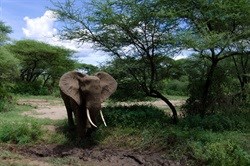
Top stories


Marketing & MediaAI changed how I work as a designer, faster than I expected
Emmanuel Naidoo, Ignition Group 10 hours




More news












ESG & Sustainability
Can Ramaphosa’s crisis committee solve South Africa’s water woes?














According to the report, released by the International Fund for Animal Welfare (IFAW), in early 2014, an intense six-week investigation found a total of 3,006 endangered wildlife and wildlife parts and products for sale via 280 online market places across 16 countries.
"As poaching reaches alarming levels, wildlife cybercrime poses a sinister, silent threat to endangered species, including elephants, reptiles and birds, enabling criminals to go about their grisly business with anonymity," said Azzedine Downes, president and CEO of IFAW.
Downes said more than 100,000 elephants had lost their lives to ivory poachers in the past three years, while in 2013 more than 1,000 rhinoceros were killed by poachers for their horns in South Africa alone.
"This new IFAW report found that ivory or suspected ivory made up more than 32% of all wildlife animals and products for sale, while reptiles came in a close second at over 26%. Live animals for sale featured in 54% of the adverts, and 46% were for parts and products of wildlife. The value of the items investigated totaled nearly $11m," said Downes.
IFAW found the legality of 1,192 of the 9,482 advertisements investigated was sufficiently doubtful to warrant turning these over to law enforcers for further examination. However this may only be the tip of the iceberg as investigators were careful not to deluge enforcers with reports of potential wildlife crime. The IFAW investigation focuses on the "surface-web" namely open-source websites commonly referred to as online marketplaces, where products are freely available to the public.
Tania McCrea-Steele, IFAW Global Internet Wildlife Trade team leader, who spearheaded the investigation, said the number and demand for live animals, parts and products found by the investigation greatly varied from region to region.
"What is clear is that online market places should protect endangered wildlife by working with police and customs to catch wildlife cybercriminals, banning the sale of goods made from endangered wildlife and informing their customers about the poaching crisis and the laws against illegal wildlife trade. We recognise the efforts made by some marketplaces in using the information provided by IFAW, running enforcement programmes and by cooperating with the authorities.
"At the same time governments need to introduce stronger legislation that specifically targets online wildlife crime and must encourage and support their enforcement agencies in making sure wildlife cybercriminals are apprehended and prosecuted," she said.
eBay has introduced even tougher preventative measures on its site as a result of cooperation with IFAW and other organisations, and this year will take tougher sanctions against sellers who flout eBay's policies on wildlife products.
"eBay does not tolerate the sale of illegal wildlife trade on its site. In addition eBay policies regarding ivory are stricter than the law and generally prohibit all ivory products. eBay is committed to an ongoing programme of strict enforcement working closely with IFAW as well as law enforcement," Wolfgang Weber, eBay director commented.